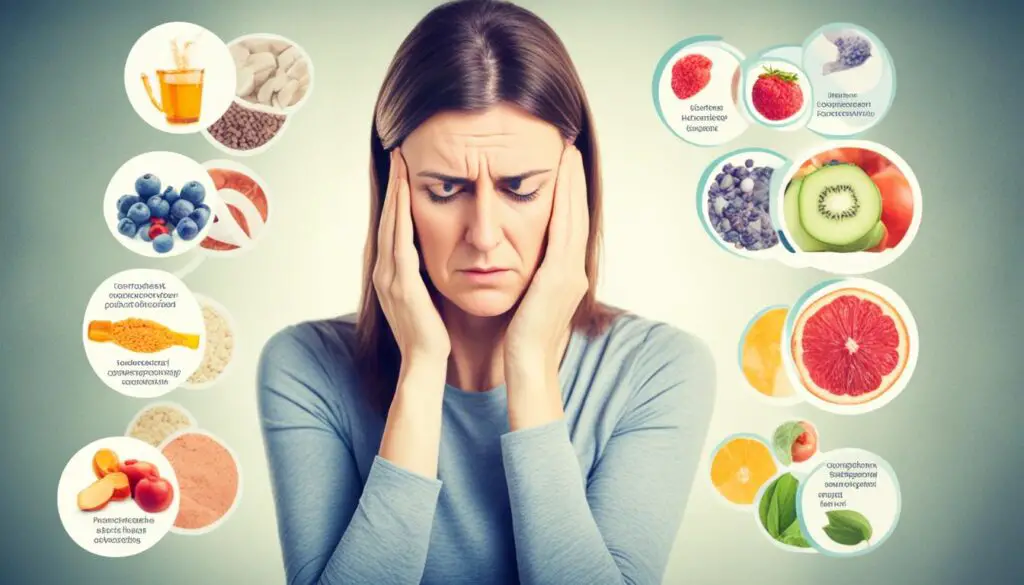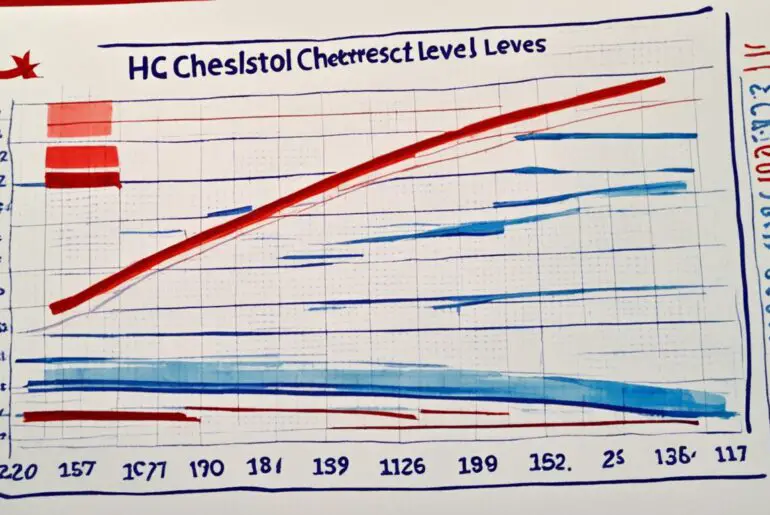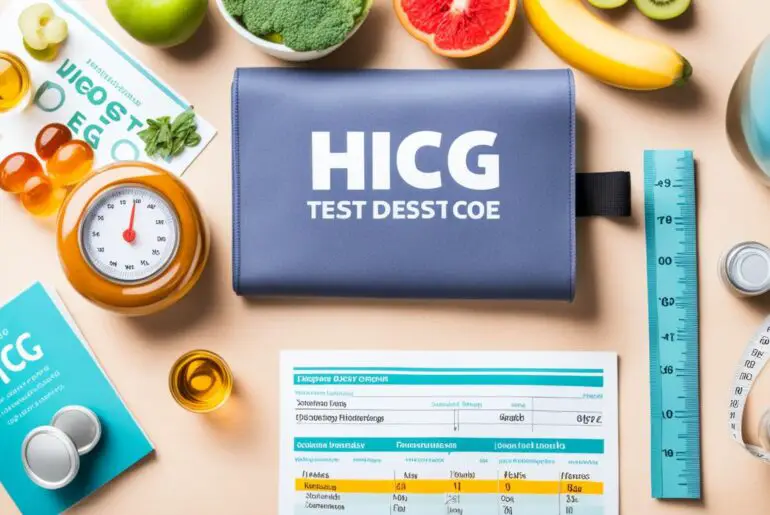Are you considering HCG injections or drops for weight loss? Before you make your decision, it’s crucial to understand the potential side effects and risks involved. The use of HCG for weight loss purposes has been a subject of controversy, with claims of quick and easy weight loss. But are these claims backed by scientific evidence? And more importantly, are the side effects worth the potential benefits?
Key Takeaways:
- The FDA has deemed HCG weight-loss products unsafe and ineffective.
- Severe calorie restriction, a key component of the HCG diet, can lead to various side effects.
- There is a potential risk of blood clots forming and blocking blood vessels with the use of HCG.
- Real HCG injections are available only with a prescription and should not be confused with over-the-counter HCG products.
- Exploring safer weight loss options and consulting with a healthcare professional is crucial for long-term success.
The Myth of HCG’s Effectiveness
The use of HCG for weight loss purposes has been a topic of controversy and debate. Despite claims that HCG injections or drops are effective in aiding weight loss, scientific evidence does not support these assertions. The FDA has explicitly stated that HCG has not been proven to be effective for weight loss and has advised against the use of over-the-counter HCG products.
The weight loss associated with the HCG diet is primarily a result of severe calorie restriction rather than the effects of HCG itself. Studies comparing HCG injections and placebo injections have shown no significant difference in weight loss between the two groups, indicating that HCG does not provide any additional benefits in terms of shedding pounds.
In addition to the lack of evidence supporting the effectiveness of HCG, there are potential side effects and risks associated with its use. HCG injections or drops can lead to side effects such as headaches, fatigue, and depression. These symptoms may arise due to the severe calorie restriction that accompanies the HCG diet, rather than the HCG itself.
“The FDA’s stance on HCG for weight loss is clear: it has not been proven effective, and the risks associated with its use outweigh any potential benefits,” warns Dr. Sarah Thompson, a renowned weight loss specialist.
Considering the lack of scientific evidence and the potential risks involved, it is crucial to approach the claims of HCG’s effectiveness with skepticism. It is always recommended to explore safer and more proven weight loss methods under the guidance of a healthcare professional.
HCG Injections vs. Drops – a Closer Look at the Side Effects
Both HCG injections and drops carry the possibility of side effects, although the specific effects may vary between individuals. In general, the potential side effects of HCG injections and drops include:
| HCG Injections | HCG Drops |
|---|---|
|
|
As evident from the table, the potential side effects of HCG injections and drops are quite similar. This supports the notion that the side effects are primarily related to the severe calorie restriction rather than the administration method of HCG.
It is essential to note that individual experiences may vary, and some individuals may not experience any side effects at all. However, it is crucial to be aware of the potential risks before considering the use of HCG injections or drops for weight loss.
Note: The image provided is for illustrative purposes and does not depict the exact side effects of HCG injections and drops.
The Dangers of Severe Calorie Restriction

The HCG diet is known for its severe calorie restriction, typically ranging from 500 to 800 calories per day. While this approach may promise rapid weight loss, it comes with potential dangers and adverse effects that should not be ignored.
Gallstone Formation: Diets with extremely low calorie intake can increase the risk of gallstone development. Gallstones are hardened deposits that can block the bile duct, leading to intense pain and discomfort.
Irregular Heartbeat: Severe calorie restriction can disrupt the body’s electrolyte balance, potentially causing an irregular heartbeat. This can be especially risky for individuals with existing heart conditions.
Nutrient Deficiencies: Consuming such limited calories can result in nutrient deficiencies, as the body may not receive an adequate supply of essential vitamins, minerals, and macronutrients.
Electrolyte Imbalances: Electrolytes, such as sodium, potassium, and magnesium, play crucial roles in maintaining proper bodily functions. Severe calorie restriction can disrupt the balance of electrolytes, leading to fatigue, weakness, and other negative symptoms.
Side Effects: Following the HCG diet often comes with several side effects. People may experience irritability, restlessness, fluid buildup (edema), and swelling of the breasts in males (gynecomastia).
“The HCG diet’s severe calorie restriction can lead to gallstone formation, irregular heartbeat, nutrient deficiencies, and electrolyte imbalances.”
Furthermore, there is a concern about the potential development of blood clots, which can be life-threatening. This risk should not be taken lightly and needs to be considered before embarking on the HCG diet.
The Controversy Surrounding HCG Products
The use of HCG diet products, such as injections and drops, has sparked controversy and raised concerns among healthcare professionals. While these products are widely available on the market and often labeled as homeopathic, they have been deemed illegal by the Food and Drug Administration (FDA).
It is important to note that HCG products do not contain real HCG and have not been proven to be effective for weight loss. The labeling as homeopathic can be misleading, as it does not guarantee the safety or efficacy of these products.
“The lack of regulation and unknown ingredients in HCG products pose significant risks to consumers.”
The controversy surrounding HCG products stems from their unregulated nature and the potential risks they pose. Without proper regulation, it is difficult to determine the safety and quality of these products.
It is crucial for individuals to exercise caution when considering the use of HCG products for weight loss. This includes being mindful of where these products are purchased, as there is a risk of unknowingly obtaining counterfeit or substandard products.
The Risks of Unregulated HCG Products
The lack of regulation in HCG products means that the ingredients used and their concentrations may vary significantly. This variability increases the risk of adverse side effects and potential interactions with other medications or medical conditions.
Consumers should be aware that using HCG products for weight loss purposes without proper medical guidance can be dangerous. The potential side effects of these unregulated products can range from mild to severe, including:
- Fatigue and lethargy
- Mood swings and irritability
- Gastrointestinal issues, such as nausea and diarrhea
- Fluid retention and swelling
- Headaches and dizziness
Consulting with a healthcare professional before using any HCG product is crucial. A healthcare professional can provide personalized guidance, assess potential risks, and recommend safer and more effective weight loss alternatives.
Side Effects and Risks Associated with the HCG Diet

The HCG diet is not without its risks and can lead to various side effects. It is essential to be aware of these potential complications before considering the use of HCG injections or drops for weight loss.
Common Side Effects
Some of the common side effects of the HCG diet include:
- Fatigue: Many individuals on the HCG diet experience feelings of fatigue and low energy levels.
- Irritability and Restlessness: The severe calorie restriction associated with the HCG diet can lead to irritability and restlessness.
- Depression: Some individuals may experience feelings of sadness or depression while on the HCG diet.
- Fluid Buildup (Edema): Fluid retention and swelling, known as edema, can occur as a side effect of the HCG diet.
- Swelling of the Breasts in Males (Gynecomastia): Men may experience breast swelling and tenderness while on the HCG diet.
Potential Risks
In addition to the common side effects, there are potential risks associated with the HCG diet:
- Blood Clot Formation: There is a risk of blood clots forming and blocking blood vessels, which can lead to serious complications such as pulmonary embolism or stroke.
- Gallstone Formation: Severe calorie restriction can increase the risk of gallstone formation, which can cause abdominal pain and other digestive issues.
- Irregular Heartbeat: The HCG diet’s low calorie intake may lead to irregular heartbeats and arrhythmias.
- Essential Nutrient Deficiencies: The limited food choices and calorie restriction may result in inadequate intake of essential vitamins and minerals.
- Electrolyte Imbalances: Severe calorie restriction can disrupt the balance of electrolytes in the body, potentially leading to muscle weakness, fatigue, and other health issues.
The Importance of Understanding Side Effects and Risks
It is crucial to understand the potential side effects and risks associated with the HCG diet before embarking on this weight loss journey.
By having a clear understanding of the possible complications, individuals can make informed decisions about their health and choose safer and more effective alternatives for weight loss.
| Side Effects | Risks |
|---|---|
| Fatigue | Blood Clot Formation |
| Irritability and Restlessness | Gallstone Formation |
| Depression | Irregular Heartbeat |
| Fluid Buildup (Edema) | Essential Nutrient Deficiencies |
| Swelling of the Breasts in Males (Gynecomastia) | Electrolyte Imbalances |
The Unregulated Nature of HCG Products
When considering HCG diet products, particularly those sold over-the-counter, it is important to understand that they are not regulated by the FDA. These products are often labeled as “homeopathic,” but this does not guarantee their safety or effectiveness. Real HCG injections, which can raise blood levels of HCG, are available only with a prescription.
However, it is crucial to be aware that the majority of HCG products on the market do not contain real HCG and are considered scams. The lack of regulation and unknown ingredients in these products pose significant risks to consumers. Therefore, caution must be exercised when purchasing and using HCG products, as their safety and quality cannot be guaranteed.
| HCG Injections | HCG Drops |
|---|---|
| Available only with a prescription | Generally available without a prescription |
| May have proper dosages and ingredients if obtained through a reputable source | Quality and ingredient consistency can vary significantly |
| Need to be administered by a healthcare professional | Taken orally without supervision |
| Potential risks of injection-related complications | Potential for inaccurate dosing and absorption issues |
HCG diet products should be approached with caution due to their unregulated nature. Consultation with a healthcare professional is highly recommended before considering the use of HCG injections or drops for weight loss purposes.
Quote:
“It is crucial to exercise caution when purchasing and using HCG products, as their safety and quality cannot be guaranteed.”
By educating oneself on the unregulated nature of HCG products, individuals can make informed decisions and explore safer weight loss alternatives that prioritize both effectiveness and safety.
The Importance of Safer Weight Loss Methods

If weight loss is your goal, it is crucial to consider safer and more effective methods than the HCG diet. Consulting with a healthcare professional can provide you with guidance on making healthy changes that lead to sustainable and permanent weight loss. By implementing a balanced diet, increasing physical activity, and addressing any underlying medical conditions that may affect weight, you can achieve your goals while minimizing risks.
Unlike the HCG diet, safer weight loss methods focus on overall health and well-being. They do not rely on severe calorie restriction or the use of unregulated HCG products, which can lead to adverse effects. Instead, these methods prioritize gradual and sustainable weight loss, ensuring long-term success.
By implementing a healthy and balanced diet, you provide your body with the nutrients it needs to function properly, while still creating a calorie deficit necessary for weight loss. Increasing physical activity helps to burn calories and build lean muscle, resulting in a healthier body composition.
Addressing any underlying medical conditions that may affect weight is also important. Certain conditions, such as thyroid disorders or hormonal imbalances, can make weight loss more challenging. By working with a healthcare professional to identify and address these issues, you can optimize your weight loss journey.
Choosing safer weight loss methods not only reduces the risk of adverse effects but also enhances your overall health and well-being. It is essential to prioritize your long-term health and work with a healthcare professional to create an individualized weight loss plan that suits your needs and goals.
| HCG Injections | HCG Drops |
|---|---|
| Requires medical supervision and a prescription. | Available over-the-counter without a prescription. |
| Injected directly into the body. | Oral drops or sublingual administration. |
| Potential side effects include headache, fatigue, and depression. | Potential side effects include nausea and digestive issues. |
| Requires proper storage and handling as it is a delicate hormone. | Easier to transport and store. |
| May have a faster onset of action. | May take longer to show effects. |
The Importance of Consulting with a Healthcare Professional
Before considering HCG injections or drops for weight loss, it is crucial to consult with a healthcare professional. Seeking expert guidance from a healthcare professional ensures that you receive personalized advice based on your individual health needs and goals. They will be able to evaluate the potential risks and side effects associated with the HCG diet and provide recommendations for safer and more effective weight loss methods.
A healthcare professional can help you navigate through the complexities of the HCG diet and assess whether it is a suitable option for you. They have the expertise to determine if the potential benefits outweigh the risks, taking into consideration your unique medical history, current health status, and any underlying conditions that may impact your weight loss journey.
By consulting with a healthcare professional, you can have peace of mind knowing that you are making informed decisions regarding your health and well-being. They can also provide alternatives to the HCG diet that may be more effective and have fewer potential side effects.
Remember, prioritizing your health and well-being should be the foundation of any weight loss strategy. Seeking professional advice ensures that you have access to the most accurate information and guidance tailored to your specific needs, helping you make safer choices that align with your long-term goals.
Conclusion
The use of HCG injections or drops for weight loss purposes poses significant risks and has been deemed unsafe and ineffective by the FDA. Severe calorie restriction, a key component of the HCG diet, can lead to various side effects and health risks.
Consulting with a healthcare professional is essential to explore safer and more effective weight loss options. It is important to prioritize overall health and well-being when considering any weight loss strategy. There are alternatives available that can help individuals achieve their weight loss goals without subjecting themselves to the potential side effects of HCG injections or drops.
By working with a healthcare professional, individuals can receive personalized guidance and recommendations that align with their specific health needs and goals. Safer weight loss methods, such as implementing a balanced diet and increasing physical activity, can promote sustainable and long-term weight loss outcomes. Furthermore, healthcare professionals can address any underlying medical conditions that may impact weight and provide valuable support throughout the weight loss journey.
FAQ
What are the side effects of HCG injections?
Some potential side effects of HCG injections include headache, fatigue, and depression.
Are there side effects associated with HCG drops?
Yes, side effects of HCG drops may include headache, fatigue, and depression.
What is the safety comparison between HCG injections and drops?
Both HCG injections and drops carry potential risks and side effects.
What are the differences in side effects between HCG injections and drops?
The side effects of HCG injections and drops are generally similar and may include headache, fatigue, and depression.
Are there any risks associated with HCG injections or drops?
Yes, there is a potential risk of blood clots forming and blocking blood vessels with the use of HCG injections or drops.
What is the review of side effects for HCG injections vs drops?
The side effects of HCG injections and drops are generally the same and may include headache, fatigue, and depression.
What are the potential side effects of HCG injections?
Some potential side effects of HCG injections include headache, fatigue, and depression.
What are the potential side effects of HCG drops?
Potential side effects of HCG drops may include headache, fatigue, and depression.
Are there any adverse effects of HCG injections or drops?
Yes, potential adverse effects of HCG injections or drops include headache, fatigue, and depression.
Are HCG injections and drops safe for weight loss?
The use of HCG injections or drops for weight loss purposes has been deemed unsafe by the FDA.
What are the side effects of HCG injections for weight loss?
Some potential side effects of HCG injections for weight loss include headache, fatigue, and depression.
What are the side effects of HCG drops for weight loss?
Side effects of HCG drops for weight loss may include headache, fatigue, and depression.
Are over-the-counter HCG products safe?
No, over-the-counter HCG products are illegal and pose risks to consumers.
Can severe calorie restriction cause side effects?
Yes, severe calorie restriction, as seen in the HCG diet, can lead to side effects such as fatigue, irritability, and fluid buildup.
What are the risks of severe calorie restriction?
Risks of severe calorie restriction include gallstone formation, irregular heartbeat, and nutrient deficiencies.
Are HCG products regulated by the FDA?
No, HCG products, particularly those sold over-the-counter, are unregulated by the FDA.




